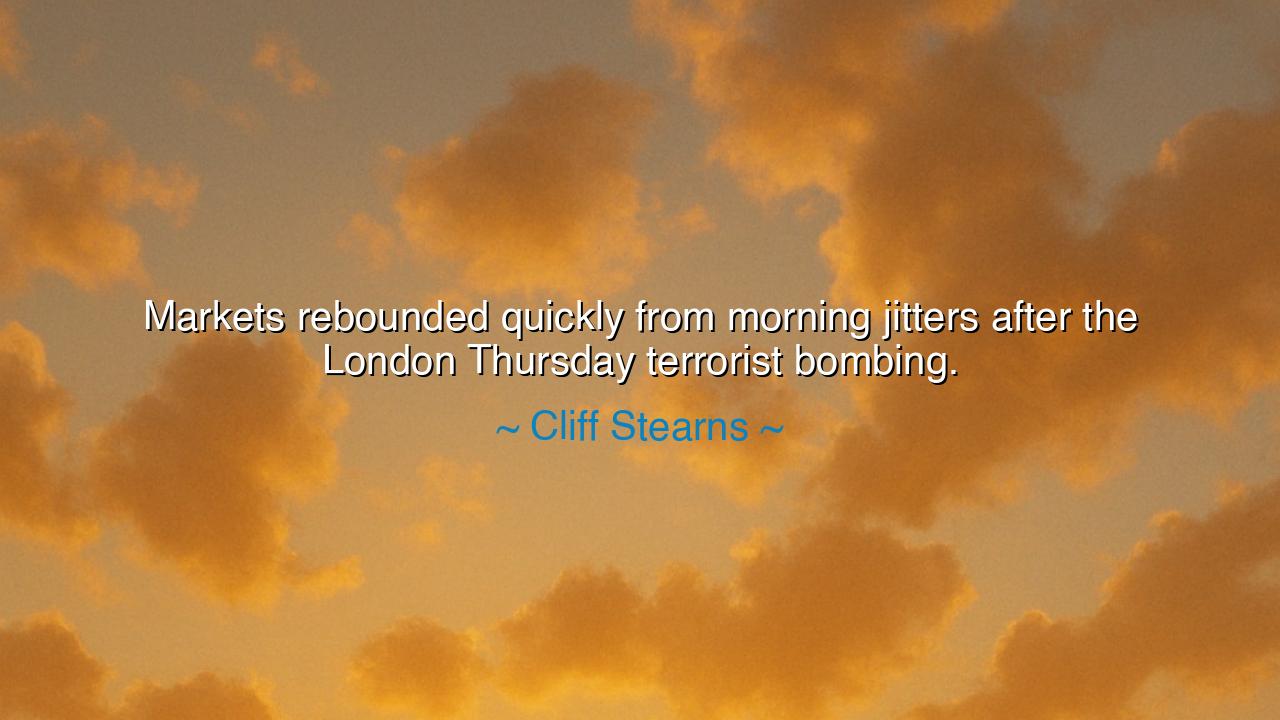
Markets rebounded quickly from morning jitters after the London
Markets rebounded quickly from morning jitters after the London Thursday terrorist bombing.






"Markets rebounded quickly from morning jitters after the London Thursday terrorist bombing." — Cliff Stearns. In this statement, Cliff Stearns reflects on the resilience and adaptability of the financial markets in the face of terror and uncertainty. The imagery of morning jitters—a feeling of unease that grips the market in the aftermath of a devastating event—followed by a swift recovery, speaks to the underlying strength of systems that are often assumed to be fragile. The markets, like the human spirit, have the ability to face shock, to endure, and to bounce back from the most traumatic and unexpected disruptions. Yet, this resilience does not come without cost or reflection. It calls upon the deeper forces that guide and shape human behavior in the face of adversity.
In the ancient world, resilience in the face of adversity was a virtue deeply admired and cultivated. Consider the example of Hannibal, the Carthaginian general, who faced overwhelming odds in his wars against Rome. His army marched over the Alps to strike at the heart of the Roman Empire, a feat of determination and resolve. When Rome was shaken by his invasion, it could have succumbed to fear, but instead, the Roman republic, like the markets, demonstrated an astonishing capacity for recovery and strength. In the face of terror and destruction, they rebounded with a vengeance, rebuilding their forces and ultimately defeating Hannibal. This timeless story speaks to the indomitable will of those who, when faced with crisis, choose not to remain paralyzed by fear but to adapt, regroup, and move forward.
The Romans also understood that uncertainty and instability were inherent parts of life. Julius Caesar, in his time of political and military unrest, faced multiple instances where his plans seemed on the brink of collapse. Yet, Caesar knew that true power and strength lay not in avoiding challenges but in overcoming them. In moments of crisis, Caesar’s ability to regroup, to inspire those around him, and to chart a course through uncertainty made him not just a leader, but a symbol of the resilience that defines great civilizations. Just as Caesar responded to threats with calculated action, the markets, too, demonstrate the same ability to absorb shocks, realign, and emerge stronger than before.
History offers us countless examples of nations, like the Romans, that have faced monumental upheaval yet found ways to rebound. After the Second World War, Europe lay in ruins, with economies shattered and political systems overturned. Yet, within a matter of decades, nations like Germany and Japan rebuilt themselves into global economic powers. This phenomenon—known as the post-war economic miracle—was a testament to the resilience of human ingenuity and the ability of societies to adapt to the most dire circumstances. Similarly, the global financial markets, though often shaken by terrorism or crisis, exhibit a similar capacity for regeneration, proving that adversity is not the end but the beginning of a new chapter in economic and social recovery.
In our own lives, the lesson is clear: resilience in the face of adversity is not a trait we are born with but one that is forged in the fires of struggle. Just as the markets rebound after a shock, so too can we, as individuals, rise from the challenges and difficulties that come our way. When faced with fear, uncertainty, or loss, we have the ability to regroup, to find strength in what remains, and to push forward into the future. Whether through personal setbacks, career changes, or societal challenges, our capacity to adapt and recover is what ultimately defines our character and our success.
Like the great leaders of the past—Hannibal, Caesar, or the post-war economies—we must embrace uncertainty as an inherent part of life. It is through this acceptance that we can transform fear into action and crisis into opportunity. Each time we face a challenge, whether it’s a personal failure or a global disaster, we are given the chance to rebuild, to redefine our future. This is the true nature of resilience—not in avoiding obstacles, but in learning to rise, stronger and more determined, after each fall.
So, when life’s challenges—be they economic, personal, or social—shake you to the core, remember the lessons of history. Just as the markets rebound from terror and uncertainty, so can you. The key lies in how you respond. Resilience is not about being unaffected by adversity, but about acknowledging its presence and choosing to move forward, with strength, adaptability, and vision. Let this lesson be a guide as you navigate the uncertainties of your own life, knowing that the ability to bounce back lies not in avoiding the storm, but in finding your center and purpose within it.






AAdministratorAdministrator
Welcome, honored guests. Please leave a comment, we will respond soon